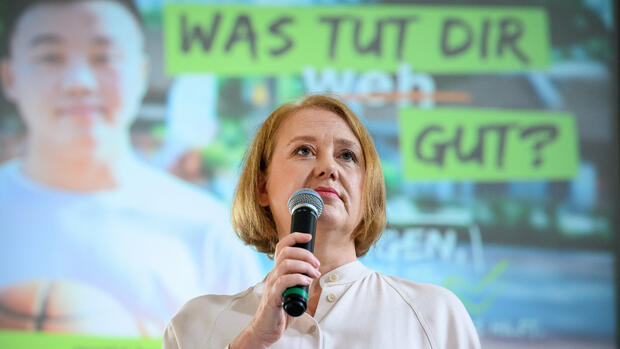The family minister wanted to get her project through the cabinet today, but technical questions apparently still remain open.
(Photo: dpa)
Berlin Basic child security will not be decided in the cabinet this Wednesday as initially planned. There are still unanswered questions, the Handelsblatt learned from government circles, and detailed calculations still need to be made.
The bill was still being worked on until recently. Among other things, the specific wording that stated that last year one in five children was considered to be at risk of or affected by poverty was deleted. A newer version now states that “too many children” are still affected.
There has been a debate about basic child security – a core concern of the Greens – for months. Finance Minister Christian Lindner (FDP) was initially not prepared to provide the money for the project as requested by Family Minister Lisa Paus (Greens). Paus had originally estimated twelve billion euros without being able to specifically justify the amount. Lindner budgeted two billion euros in its medium-term financial planning.
Because Paus was not satisfied with this, the Family Minister initially blocked Lindner’s Growth Opportunities Act, which provides tax relief for the economy, in the cabinet in mid-August. In this respect, it is reasonable to suspect that Lindner has now lodged a so-called “management reservation” against Paus’ draft. However, the ministry said that it was not about political questions, but about administrative ones.
In the latest draft law, Paus calculates costs of 1.87 billion euros in the starting year of 2025, which will grow to 5.85 billion euros by 2028. Paus hopes that parents who today do not claim the child allowance to which they are entitled due to shame or ignorance will benefit from the automatically paid basic child benefit in the future. This explains part of the annual increase.
Authorities expressed serious concerns
It is not only in the government that there are still doubts as to whether the draft law is ready for approval. The Federal Employment Agency (BA), which is supposed to play a central role in the practical implementation of basic child welfare, expressed considerable concerns in its statement on the law and questioned the planned start date of January 1, 2025.
The Nuremberg authorities wrote that they needed enough time and legal means to make the necessary IT and software adjustments. The start date of January 2025 is “now assessed by the BA as unrealistic,” according to the statement.
The BA initially made a similar statement regarding citizens’ money. The government therefore decided to let the reform come into force gradually. When it comes to basic child welfare, the authority itself considers such a procedure to be unrealistic. “Due to the many organizational and content-related questions,” even a gradual introduction is “no longer conceivable,” she writes.
When it comes to basic child security, child benefit, child allowance, citizen’s benefit and the benefits from the education and participation package are to be brought together. A large number of authorities are currently responsible for this, including the BA family fund, job centers, social welfare offices and local and district offices. A merger creates new interface problems and sometimes also comes up against data protection hurdles.
SPD parliamentary group deputy Dagmar Schmidt said on Deutschlandfunk this morning that she did not know the exact reasons why the issue was not yet on the cabinet’s agenda on Wednesday. However, it is a very complex and difficult legislative proposal. She would prefer that the Bundestag receive a good and well-thought-out bill so that the same thing as with the heating law doesn’t happen again.
Paus wants to get the law through the cabinet in September
Paus also didn’t want to dramatize the shift. “Politically everything is united, it’s about legal and technical details that we are still clarifying together,” said the family minister to the news portal “T-Online”. This is not unusual with a complex body of law. She is confident that basic child security will be decided in September, as was always planned.
There was also a recent dispute over the Greens’ demand to provide an immediate surcharge of 20 euros for refugee children who are covered by the Asylum Seekers’ Benefits Act. However, the FDP insists that refugee children are not covered by basic child welfare.
More: Paus names rates for basic child security – and receives criticism from the FDP
